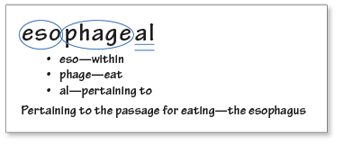Web Page: Perfecting Your Writing Process
Web Page: Prewriting
Web Page: Revising and Editing Writing Assignments
Web Page: Editing and Proofreading
Web Page: How to Publish a Book, Get Published
One powerful way to increase your vocabulary is to keep a list of new words and their definitions for each subject you study.
Your Turn Use a section of your notebook or a digital file to create a vocabulary list. Whenever you hear or read an unfamiliar word, record its definition. List the word’s parts. Give an example of the term. Use the word in a sentence. Draw a picture of what the word represents if possible.
You can learn many of the prefixes, roots, and suffixes on pages 166-177 by using them to build your own words.
Your Turn Use prefixes, suffixes, and roots to create new terms described here:
Most new words you encounter in school subjects will be built from the word parts on pages 166-177. This activity will help you parse the words.

Your Turn Write down four or five new words that you find browsing the Web. Circle any parts you think are roots. Underline any parts you think are prefixes. Double-underline any parts you think are suffixes. Then look up the parts and write down their meanings.
Web Page: Perfecting Your Writing Process
Web Page: Prewriting
Web Page: Revising and Editing Writing Assignments
Web Page: Editing and Proofreading
Web Page: How to Publish a Book, Get Published
© 2014 Thoughtful Learning
